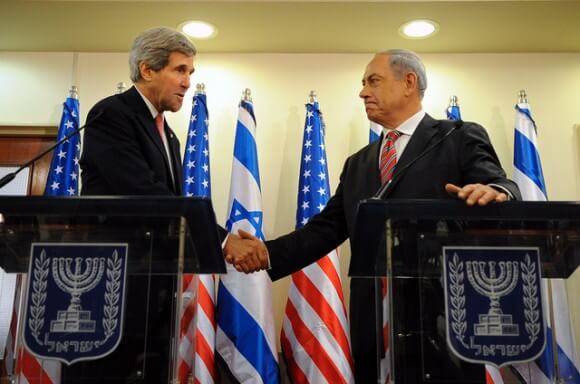
Some developments re the Iran war-drums.
On Tuesday, John Kerry told a dubious Senate committee that Congress should hold off on more sanctions on Iran, even as a warmongering Republican questioner said that we were appeasing the Nazis all over again. Here is a choice defensive moment from John Kerry’s testimony (boldface mine):
I do want to say one quick word about Israel and Prime Minister Netanyahu. I speak to the Prime Minister usually a couple times a week or several times. I talked to him yesterday morning, and I am leaving tomorrow and I’ll be seeing him Thursday night. We are totally agreed that we need to focus on this final comprehensive agreement. And Yossi Cohen, the national security advisor to the Prime Minister, is here in Washington this week working with our experts. And we will work hand in hand closely, not just with Israel, but with our friends in the Gulf and others around the world.
I think Kerry is reflecting the political wisdom, Keep your friends close, but hold your enemies so tight they can’t even wiggle. (The same wisdom Obama expressed in his famous moment with Sarkozy. “You’re tired of him; what about me? I have to deal with him every day.”)
Next, in an excellent blogpost at The New York Times, Bill Keller says the neoconservatives are entrenched in Washington, and they are Israel-centric warmongers who don’t know the US national interest. Hardliners in Iran and the US, Keller writes,
[b]oth believe America’s role in the Middle East revolves in large measure around Israel. To the Iranian hard core, Israel is a nuclear-armed interloper and America’s conjoined infidel twin; to their American counterparts Israel’s values and interests are inextricable from our own, and Benjamin Netanyahu is a more trustworthy defender of our security than Barack Obama.
Hardliners in both countries are fighting a rearguard action in their own countries. In the U.S., the hawks fear they are losing sway to a conflict-averse president who has the support (at least on the issue of attacking Iran, if not on much else) of a war-weary public. In Iran the Supreme Leader and the Revolutionary Guard face the mounting frustration of a largely young, economically punished population – a volatile discontent that was expressed in the streets in 2009 and at the ballot box this year.
Yet in both countries, the hawks have disproportionate influence – in Washington, because no public figure wants to be seen as soft on Iran… [A] failure of negotiations would delight both of them – American hawks because Israel could get on with the business of bombing..
I wish Keller had had this epiphany before he pushed the Iraq war ten years ago. Also, it would be nice if Keller were a little more frank with his readers about why the hardliners have such purchase in D.C. MJ Rosenberg– who explained the Israel Firster argument a long time ago– says it’s about money.
The Israel Lobby has the media so intimidated that no one in the mainstream media has the nerve to tell the American people why Congress is likely to pass new Iran sanctions that would kill the Iran negotiations.
No one. By no one, I mean no one.
If all you knew about this subject came from the media (including the major bloggers except Andrew Sullivan), you would think that Members of Congress are worried that the Iran deal poses problems for US security.
Of course, that is ridiculous. Every single Member of Congress who expresses “concern” about the Iran deal is doing so to please AIPAC and its donors. Almost all get money from AIPAC and the rest want to.
Keller is uncomfortable with the fact that the Iranian discourse is filled with conspiracy theories about the US and Israel; but leaving aside the hateful invective of the Supreme Leader– 
Then there’s this. Avi Mayer, the Israeli-American new media spokesman for the Jewish Agency, seizes on neoconservative polling data to say:
77% of Americans say an #Iran nuclear arms capability would be more dangerous than a U.S. strike on its facilities: http://t.co/jFmPk1cNPC
— Avi Mayer (@AviMayer) December 11, 2013
And:
84% of Americans believe #Iran is using the Geneva talks to stall for time as it develops its nuclear program – http://t.co/jFmPk1cNPC — Avi Mayer (@AviMayer) December 11, 2013
Scott Roth leaped on this.
Is @avimayer trying to say that his native country should attack Iran? He’s definitely trying to imply something. — Scott Roth (@scottroth76) December 12, 2013
Here is some of the polling, from Frank Luntz:
“Finally, we have found an issue of substance that both Democrats and Republicans agree on. The fear of Iranian nuclear weapons unites just about everyone.”
That is the key result of a survey of 900 likely voters taken December 7-9, 2013 that asks what Americans think of negotiations between their government and Iran. For us, this is the first time this year that an issue of this signific ance generates almost universal support across the demographic and political landscape:
By lopsided margins, supporters of both political parties overwhelmingly favored renewed sanctions against the Iranian government, in addition to and regardless of current negotiations.
Younger Obama voters and older Romney voters BOTH want the American negotiators to insist on a non-nuclear Iran, and they want sanctions to remain until that objective [etc]...
Speaking of Khameini's feed, what about this picture (on the right) from the Supreme Leader. I agree. So do a lot of Americans.



“Speaking of Khameini’s feed, what about this picture (on the right) from the Supreme Leader. I agree. So do a lot of Americans”. this is a GREAT picture. I’d like to see it on transit ads in big American cities. Better still if there were a quote (Tutu?) that apartheid in Greater Israel is worse than it ever was in South Africa. All I found in a quick search was this, from MondoWeiss:
Frank Luntz, the neocon’s pollster: http://www.dailypaul.com/19947/luntz-the-neocon-pollster-manipulating-for-the-msm
MJ Rosenberg misses the mark again.
Yes, what keeps people in D.C. loyal to Israel is money – but that is only partly the case. The NRA is very well funded, it has tons of billionaires willing to give as well as a lot of grassroots activists. The healthcare lobby is even better funded, it’s one of the top 3 lobbies in Washington(the other two is Wall Street and the Israel lobby).
It managed to stall health care reform for a long time, and Obamacare isn’t nearly as progressive as it should be. But it’s far better than the status quo, which the healthcare lobby wanted to keep.
My point? Money is very powerful, but there are principles which can, over the long term, override that influence.
AIPAC’s power is not just money. This is MJ’s Zionist blind spot yet again. It’s also about ideology. Why is Bill Keller so uncomfortable talking about the why, not just what is fact? Is MJ going to blame money here too? Why are people like Ben Smith at Buzzfeed so willing to help neocons smear writers at CAP or delegate the dirty work to Rosie Gray on Max Blumenthal?
What about the NYT, whose coverage of the conflict is getting more and more hasbara-friendly by the day, often not even talking to Palestinians at all even in stories about them. Is the NYT coverage of Israel governed by money alone?
No, of course not. Zionism is an ideological committment. I’m annoyed when Noam Chomsky tries to blame “international capital” for the situation in the West Bank, too. Neither Chomsky/Finkelstein nor MJ Rosenberg wants to talk about Jewish sociology, but you have to. It’s a topic we’ve been debating at length at this site for years now, but essentially you have to be willing to broach the subject of the Jewish rise to power, especially in the MSM, to describe why Congressmen are scared of taking progressive positions. It’s not just campaign funds. It’s also how they get covered in the media.
And I haven’t even mentioned the most powerful Zionist in the media, who’s a non-Jew, Rupert Murdoch. Or take David Cohen, VP of Comcast who is very devoted to Israel. You can go down the line.
These people are not motivated by money, and they will make sure Congressmen- and women will pay a price in the media if they take positions on Palestine which are progressive. MJ trying to simplify it to just money is trying to whitewash the issue, like Chomsky and Finkelstein before him.
Luntz, the pollster here, is a self-proclaimed Zionist who has also said his great priority in life is the Israel Project. He manipulates public opinion though his array of choice questions–regularly in Fox News, for example, and here Mayer passes on via Twitter the latest results of Luntz’s latest poll. I think he should get the Bernays-Gobbels Award for carefully lipsticking the pig for prom night. http://www.jpost.com/Opinion/Columnists/Editors-Notes-The-word-according-to-Frank
Phil, I hope you read this linked article on Luntz. You probably don’t watch Fox news, so you don’t watch Luntz playing with the dumb American public in prime time.
Poll Finds Public Doesn’t Like Iran Deal if They Don’t Know What’s in It-http://antiwar.com/past/20131211.html
“For the last few weeks, the general sense is that the US public backs the tentative deal on Iran’s nuclear program. So it’s surprising to see USA Today (12/9/13) hyping a poll that sends a very different message. Has public opinion shifted? Not really–you simply have to look at what the polls are asking.
Under the print edition headline “Few Trust Iran on Nuclear Accord,” USA Today’s Susan Page reports that “the White House and Iran face an uphill selling job to convince Americans to embrace the interim nuclear pact negotiated with Tehran last month.” Just how bad is it? Page explains that a new USA Today/Pew poll says it’s pretty bleak:
In the survey, taken Tuesday through Sunday, 32 percent approve of the deal, 43 percent disapprove. One in four don’t know or declined to answer.
This is surprising, since many other polls found the public generally supportive of the deal. Taking a look at the Iran page at PollingReport.com, a CNN poll (11/18-20/13) finds 56 percent favor the deal; an ABC News/Washington Post Poll (11/14-17/13) finds 64 percent approval.
Now, it’s entirely possible that Americans have been watching a lot of TV, and have seen a parade of hawks and skeptics talking about the need to increase the sanctions on Iran. But the real difference would seem to be simpler to explain. Those other two polls asked questions that included a summary of the deal. The ABC/Post poll, for instance, put it this way:
Would you support or oppose an agreement in which the United States and other countries would lift some of their economic sanctions against Iran, in exchange for Iran restricting its nuclear program in a way that makes it harder for it to produce nuclear weapons?
This new poll, though, asked the question this way:
From what you know, do you approve or disapprove of the agreement between the United States and Iran on Iran’s nuclear program?
So why would you get such starkly different results? Because most people actually don’t follow this story very closely at all. Forty-eight percent of respondents said they’d heard a little about the agreement, 28 percent said they’d heard nothing at all. But those people are still asked to weigh in on whether they approve or disapprove of the deal. (How does that phone conversation go, exactly? “So, do you know much about this Iran nuclear deal?” “No, not really.” “OK, so what’s your take on it, then?”)
It’s not an especially helpful survey–unless you’re looking to build opposition to the nuclear deal.”
http://www.fair.org/blog/2013/12/10/usa-today-finds-public-doesnt-like-iran-deal-if-they-dont-know-whats-in-it/